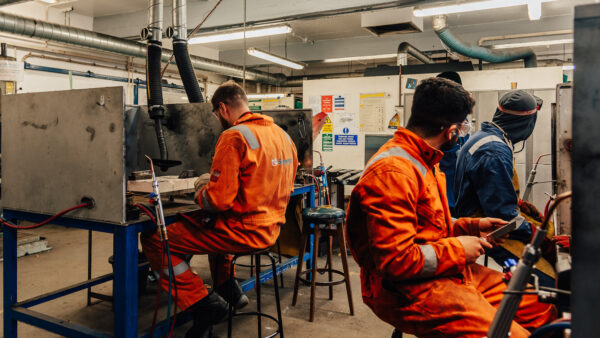
The launch of the Construction Skills Mission Board and has been broadly welcomed by the built environment sector.
As well as launching the new skills body, the government has pledged to recruit 100,000 more construction workers annually, and has unveiled plans to collaborate with Jobcentres to offer work experience and tailored placements.
Here’s what industry leaders are saying about the announcements.
David Barnes, head of policy and public affairs at the Chartered Institute of Building
“It’s encouraging to see the government taking the skills challenge seriously and listening to concerns from within the industry.
“Having ambitious targets for building new homes is all well and good, but they will never be met without ensuring the construction sector is equipped with the skilled workers to deliver them.
“While government has talked a lot about addressing the skills gap, it’s now important to move from rhetoric to tangible action and today’s announcement about closer links between industry and Jobcentres and the first meeting of the Construction Skills Mission Board are good examples of that happening.
“Our own research from earlier this year shows a high proportion of people in the UK think positively about construction careers, including two thirds of 16 to 24-year-olds, so this enthusiasm needs to be captured and converted into more people coming into roles, including construction management, planning and surveying, as well as the frontline trades.
“Close links between a wide range of voices from across the industry and policymakers is vital for progress to be made and for government to move towards solving the housing crisis.”
Tim Balcon, CEO of the Construction Industry Training Board
“Opportunities in construction are for everybody, whatever their background. By working together, we can widen the talent pool, bring in more diverse voices, and encourage more people to consider a career in construction.
“Every year, over 100,000 people receive construction training. I want many more of them to forge lasting careers in the sector. This is why the partnership with [the Department for Work and Pensions] is so vital, as it helps ensure individuals are not just trained but truly prepared for careers in construction.
“The government commitment to addressing the housing shortage, improving the country’s infrastructure, and investing in construction skills mean this is a real boom time for our industry.”
Andrew Hockey, CEO of the Engineering Construction Industry Training Board
“Engineering construction is key to the government’s growth and skills goals and project certainty is vital to encourage contractors to invest in new talent.
“Government can provide project certainty to unlock final investment decisions, while procurement and regulatory levers also have an important role to play in incentivising skills training.
“Both the ECITB and CITB have a key role to play in training new entrants. For instance, we are helping to pump prime new talent through our Scholarship and Work Ready programmes, and as part of our new 2030 strategy we will be developing additional programmes to support and incentivise companies to take on trainees ahead of project need.
“But only through a collaborative approach can we help deliver, grow and maintain a skilled workforce fit for now and the future.
“Enhanced collaboration is already underway between the ECITB and CITB on specific areas including infrastructure across Great Britain, increasing trainers and assessors, clean energy jobs and skills passporting.
“We also need to deliver projects that enable workforce transition like the ECITB’s pilot wind turbine technician cross-skill programme which supports two-way deployments across oil and gas, and wind infrastructure.
“The industrial strategy, alongside the infrastructure plan, provides vital strategic clarity and direction. It presents a critical opportunity to align training and reskilling efforts with future project pipelines, ensuring workforce readiness as new infrastructure projects come online and clean energy deployment scales.”
Katrina Dowding, UK president and CEO of Skanska
“Construction is a key driver for economic growth. Ensuring we have the right skills to support the diverse range of projects we deliver, that the industry is attractive and provides clear pathways from training to employment are key to meeting the government’s ambitions.
“Delivery of new or improved roads, railways, energy networks and commercial buildings all require a stable workforce. The Construction Skills Mission Board has the opportunity to unlock significant potential as well as helping ensure that industry can invest in the right skills to deliver the 10-year infrastructure plan.”
Richard Beresford, CEO of the National Federation of Builders
“The Construction Skills Mission Board is a recognition that construction and government must work together to tackle the skills crisis and achieve its growth ambitions.
“The [Construction Skills Mission Board’s] focus on demand acknowledges that unless the regulatory environment enables work pipelines, existing workforces cannot be sustained, and new workers cannot be added in any serious numbers.”
Rico Wojtulewicz, head of policy and market insight for the National Federation of Builders and House Builders Association
“For too long, it was assumed that training workers guarantees job. The reality is that while eight in 10 construction apprentices start their training with SMEs, these businesses only build 9% of homes, are struggling with procurement, and many are leaving the industry due to the broken planning system. As a result, many learners fall out of training because there isn’t anyone to train to retain them.
“The missing ingredient has always been government intervention. If the government can unlock project certainty and pipelines, particularly for SMEs, not only will we see more workers trained, but more will be taken on as direct employees. This means greater job security and clear, long-term career pathways.
“It cannot be overstated how important it is that so many government departments will sit on the [Construction Skills Mission Board]. It shows the Labour government have taken their growth challenge seriously.”
Andrew Eldred, deputy CEO at the Electrical Contractors’ Association
“The Construction Skills Mission Board is a once-in-a-generation opportunity to focus minds on how, working together, we can overcome long-standing barriers to improved workforce skills outcomes in the built environment.
“The proof of the pudding will inevitably take time to emerge, but by recognising the value of input from both industry leaders and broad-based, sector-led organisations such as ECA and [the Engineering and Building Skills Authority], the Mission Board is already in a stronger place than its predecessors, and this constitutes a positive first step.”
David Lewis, executive director of property services at L&Q
“We strongly welcome the government’s commitment to supporting construction careers. This investment is an essential step in tackling the housing crisis.
“It’s absolutely vital that as part of this we address the growing trades skills gap. The UK faces a shortage of 166,000 skilled tradespeople, with many nearing retirement.
“Tradespeople do far more than fix leaky taps or faulty wiring. They are essential to delivering safe, sustainable homes, and without them, the ambition to build 1.5 million homes cannot be realised.
“At L&Q, we are investing in over 70 trade apprenticeships to build the workforce of the future. We want more people to see the trades as a rewarding, long-term career, and we are proud to support them on that journey.
“Meeting this challenge requires industry, education, and government working together. We stand ready to collaborate with partners to deliver the homes this country needs… behind every home is a skilled trade, and behind every trade is a person shaping the future of our communities.”
Tom Arey, director at PfP Thrive, part of Places for People
“This is a significant move from the government and forms part of a growing, and encouraging, pattern of action on housing and skills. Recent announcements – from the National Housing Bank to long-term funding pledges in the spending review – suggest a real commitment to tackling the systemic challenges we face.
“At PfP Thrive, we’ve seen the sector step up too. We’ve just partnered with 29 housing associations whose colleagues will be trained through our academy – a major investment in future talent. With targeted government support, initiatives like this can be scaled to meet the moment.
“It’s clear that sustained collaboration between industry and government is essential if we’re to build the homes the country needs. This could be the catalyst we’ve been waiting for.”
Jason Poulter, national officer for construction at trade union Unite
“We are proud to represent workers voices and the pride they hold in their skills and trades on the Construction Skills Mission Board.
“We welcome the government’s focus on a jobs focused approach. This is the largest investment in skills for a generation and the creation of the [Construction Skills Mission Board] is a clear demonstration of industry’s commitment to supporting the skilled construction workforce of tomorrow.”
Charlotte Brumpton-Childs, national officer at trade union GMB
“The Construction Skills Mission Board brings together the government, industry and workers to help shape the future of the industry.
“GMB is thrilled to be part of this effort; our members and their skills will deliver the industrial strategy and energy infrastructure. It’s right that workers voices are championed in this process.”
Comments
Comments are closed.










After being unemployed for a year now like many I know (redundant again third time in fourteen years), with thirty five plus years experience, degree, chartered etc, South East based. I’m starting to think an awful lot of people in different organisations do not have a clue what is going on out there regarding the lack of work. Have a lot of people even worked onsite from these organisations?
There is currently not a need for people. There are loads of us sitting at home doing nothing overqualified. Amazon deliveries are the future…